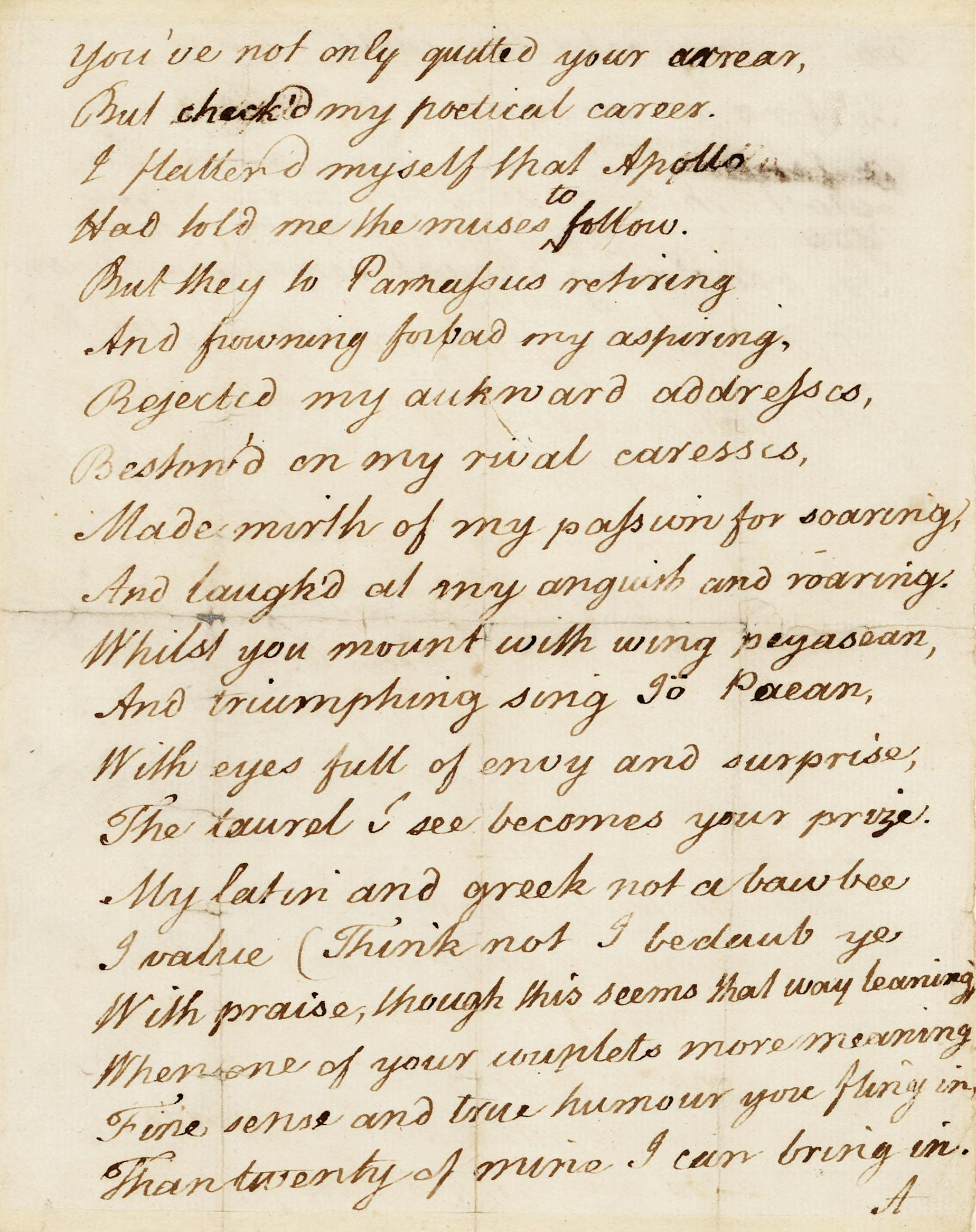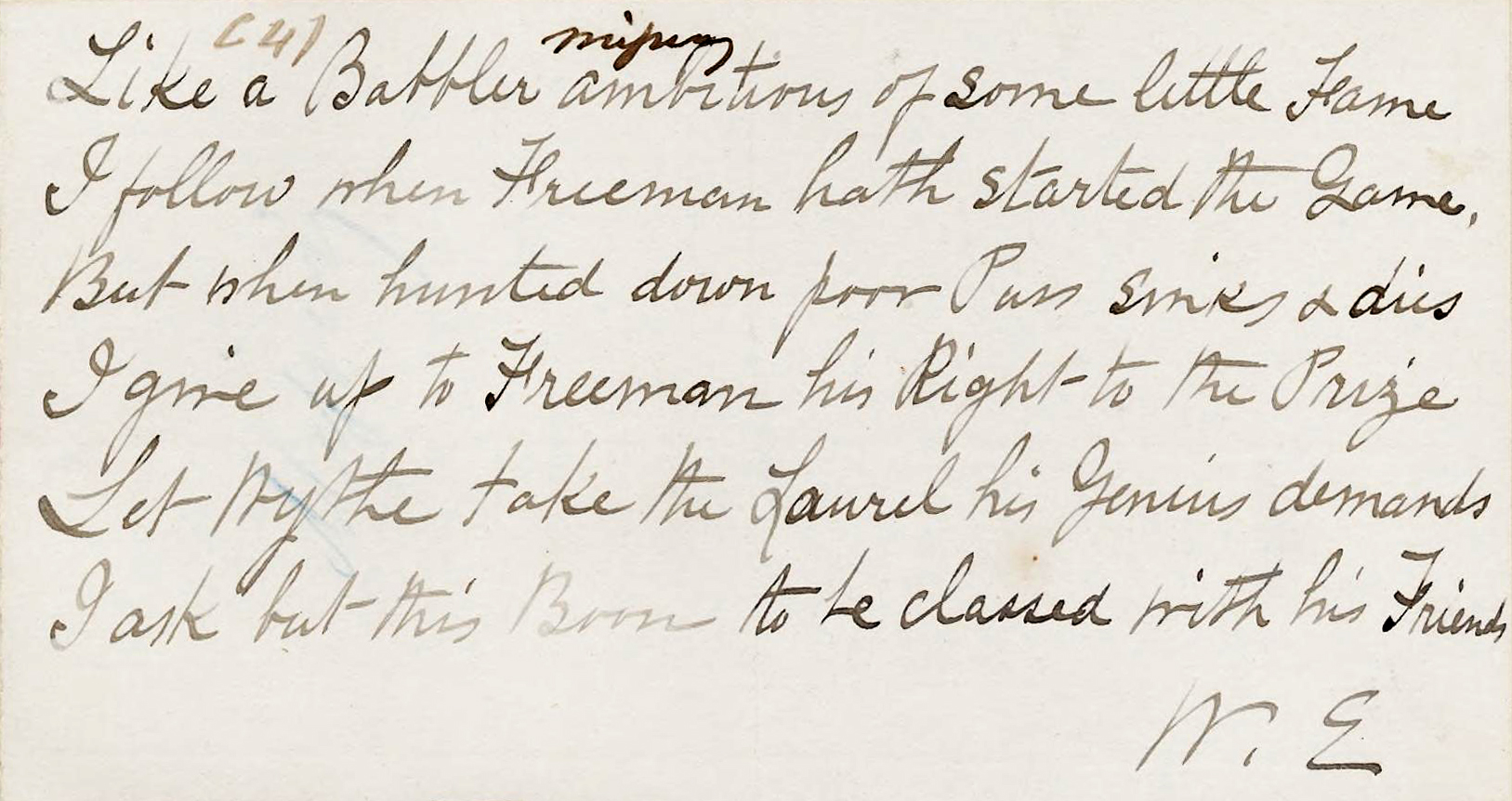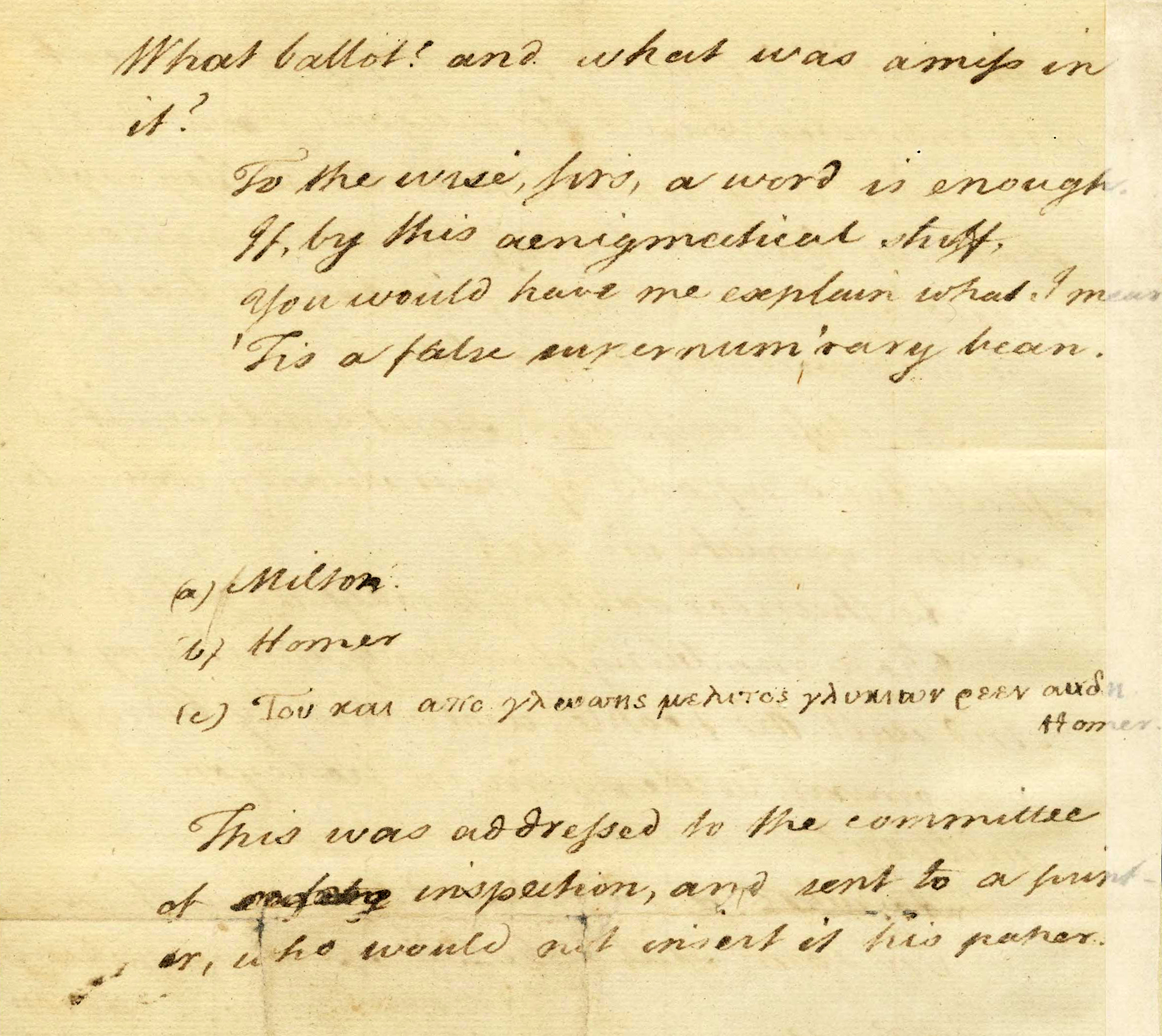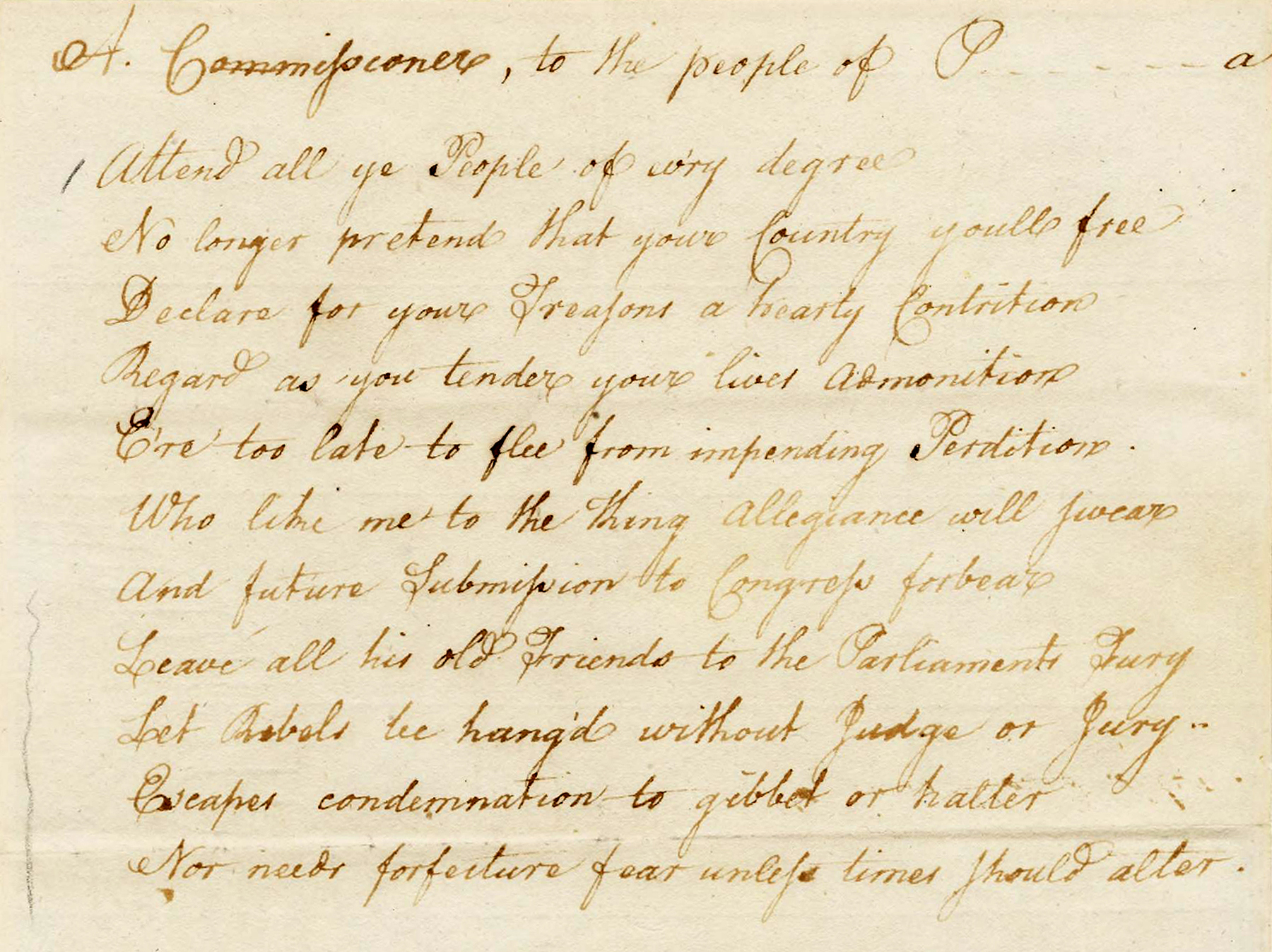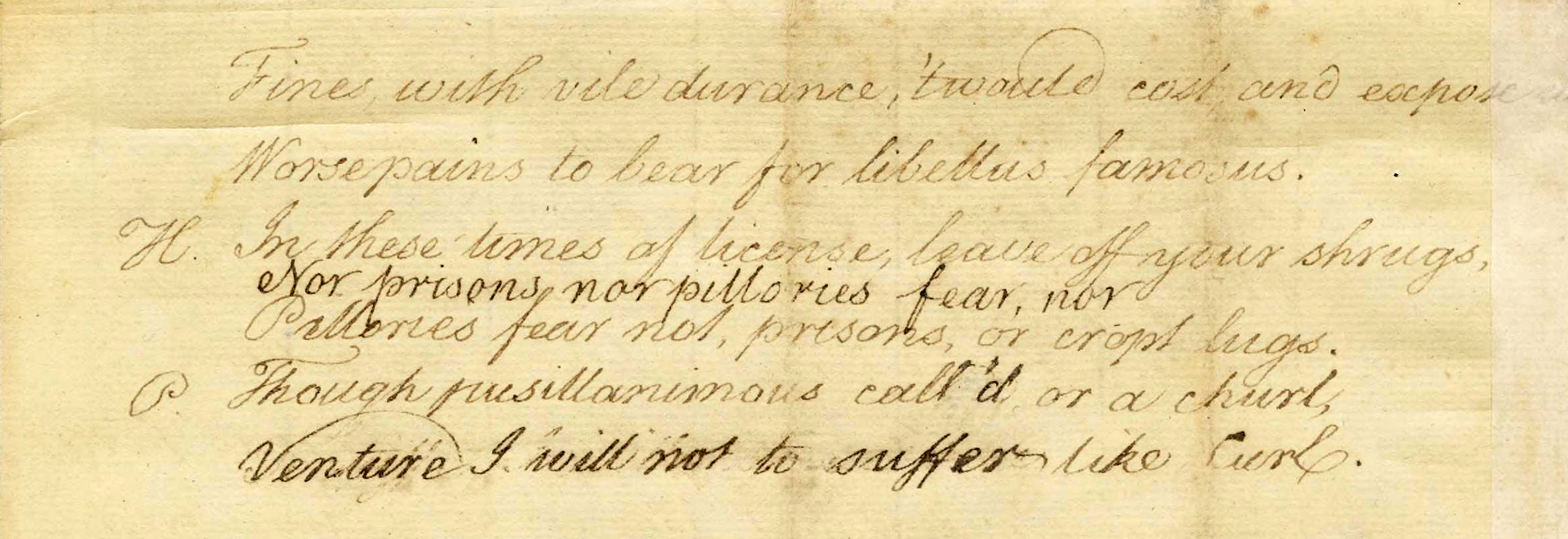Difference between revisions of "Poems on Witty Subjects in Congress"
| Line 23: | Line 23: | ||
|} | |} | ||
| | | | ||
| − | [[File:PoemsOnWittySubjectsInCongressP7.jpg|thumb|600px|Manuscript endorsed on the reverse as "1st Poem, | + | [[File:PoemsOnWittySubjectsInCongressP7.jpg|thumb|600px|Manuscript endorsed on the reverse as "1st Poem", page seven of [https://archive.org/details/poemsonwittysubj00elle ''Poems on Witty Subjects in Congress,''] from the [https://www.bpl.org/ Boston Public Library's] [https://archive.org/details/bplscarwm American Revolutionary War Manuscripts Collection.]]] |
|} | |} | ||
| Line 40: | Line 40: | ||
|} | |} | ||
| | | | ||
| − | [[File:PoemsOnWittySubjectsInCongressP3.jpg|thumb|600px|Endorsed on the reverse as "To G. Wythe / Answer to / | + | [[File:PoemsOnWittySubjectsInCongressP3.jpg|thumb|600px|Endorsed on the reverse as "To G. Wythe / Answer to / 1.st Poem", page three of ''Poems on Witty Subjects in Congress,'' from the [https://www.bpl.org/ Boston Public Library's] [https://archive.org/details/bplscarwm American Revolutionary War Manuscripts Collection.]]] |
|} | |} | ||
| Line 66: | Line 66: | ||
|} | |} | ||
| | | | ||
| − | [[File:PoemsOnWittySubjectsInCongressP5.jpg|thumb|600px|Manuscript endorses as "Poem Ans — WE / 2d, | + | [[File:PoemsOnWittySubjectsInCongressP5.jpg|thumb|600px|Manuscript endorses as "Poem Ans — WE / 2d", page five of ''Poems on Witty Subjects in Congress,'' from the [https://www.bpl.org/ Boston Public Library's] [https://archive.org/details/bplscarwm American Revolutionary War Manuscripts Collection.]]] |
|} | |} | ||
| Line 115: | Line 115: | ||
And spoil us of freedom, most precious of treasures. | And spoil us of freedom, most precious of treasures. | ||
| | | | ||
| − | [[File:PoemsOnWittySubjectsInCongressP10.jpg|thumb|600px|Manuscript endorsed as " G.W. 3d / in Answr. to E 2d, | + | [[File:PoemsOnWittySubjectsInCongressP10.jpg|thumb|600px|Manuscript endorsed as "G.W. 3d. / in Answr. to E.s 2d", page ten of ''Poems on Witty Subjects in Congress,'' from the [https://www.bpl.org/ Boston Public Library's] [https://archive.org/details/bplscarwm American Revolutionary War Manuscripts Collection.]]] |
|} | |} | ||
| Line 143: | Line 143: | ||
|} | |} | ||
| | | | ||
| − | [[File:PoemsOnWittySubjectsInCongressP21.jpg|thumb|600px|Manuscript endorsed Answer / Epigram 4, | + | [[File:PoemsOnWittySubjectsInCongressP21.jpg|thumb|600px|Manuscript endorsed <s>Poem G</s> Answer / to Epigram .4.", page twenty-one of [https://archive.org/details/poemsonwittysubj00elle ''Poems on Witty Subjects in Congress,''] from the [https://www.bpl.org/ Boston Public Library's] [https://archive.org/details/bplscarwm American Revolutionary War Manuscripts Collection.]]] |
|} | |} | ||
| Line 172: | Line 172: | ||
|} | |} | ||
| | | | ||
| − | [[File:PoemsOnWittySubjectsInCongressP23.jpg|thumb|600px|Manuscript endorsed "Answer to / the | + | [[File:PoemsOnWittySubjectsInCongressP23.jpg|thumb|600px|Manuscript endorsed "Answer E to / the Answr. to 4", page twenty-three of [https://archive.org/details/poemsonwittysubj00elle ''Poems on Witty Subjects in Congress,''] from the [https://www.bpl.org/ Boston Public Library's] [https://archive.org/details/bplscarwm American Revolutionary War Manuscripts Collection.]]] |
|} | |} | ||
| Line 221: | Line 221: | ||
|} | |} | ||
| | | | ||
| − | [[File:PoemsOnWittySubjectsInCongressP16.jpg|thumb|600px|Manuscript endorsed "Poem W.5, | + | [[File:PoemsOnWittySubjectsInCongressP16.jpg|thumb|600px|Manuscript endorsed "Poem W.5", page sixteen of [https://archive.org/details/poemsonwittysubj00elle ''Poems on Witty Subjects in Congress,''] from the [https://www.bpl.org/ Boston Public Library's] [https://archive.org/details/bplscarwm American Revolutionary War Manuscripts Collection.]]] |
|} | |} | ||
| Line 257: | Line 257: | ||
|} | |} | ||
| | | | ||
| − | [[File:PoemsOnWittySubjectsInCongressP25.jpg|thumb|600px|Manuscript endorsed "WE Answer / to 5, | + | [[File:PoemsOnWittySubjectsInCongressP25.jpg|thumb|600px|Manuscript endorsed "WE. Answer / to 5", page twenty-five of [https://archive.org/details/poemsonwittysubj00elle ''Poems on Witty Subjects in Congress,''] from the [https://www.bpl.org/ Boston Public Library's] [https://archive.org/details/bplscarwm American Revolutionary War Manuscripts Collection.]]] |
|} | |} | ||
| Line 298: | Line 298: | ||
==="Those with Whom the Powers of Government," by George Wythe=== | ==="Those with Whom the Powers of Government," by George Wythe=== | ||
| + | |||
| + | In this mix prose and verse, Wythe seems to be trying to bring to light some complaint with Congress regarding a late ballot, which he entreats the "college of censors" to inquire upon, despite one of those involved being as respected as Nestor of Greek mythology (but false as Milton's Belial): | ||
{| style="margin-bottom: 20px;" | {| style="margin-bottom: 20px;" | ||
| Line 307: | Line 309: | ||
<blockquote> | <blockquote> | ||
| − | <sup>(a)</sup> 'In close recess and secret conclave sit!' | + | <sup>(a)</sup> 'In close recess and secret conclave sit!'<ref>Milton's demonic council in [[''Paradise Lost,'']] Book I, lines 792-797: "But far within,/And in their own dimensions, like themselves,/The great seraphic lords and cherubim/In close recess and secret conclave sat;/A thousand demigods on golden seats/Frequent and full."</ref> |
</blockquote> | </blockquote> | ||
| Line 329: | Line 331: | ||
<blockquote> | <blockquote> | ||
| − | <sup>(a)</sup> 'Whose tongue drops manna, <sup>(b)</sup> thick as driven snow,<br /> | + | <sup>(a)</sup> 'Whose tongue drops manna,<ref>Milton, ''[[Paradise Lost]],'' Book II, lines 112-113: "On the other side uprose/[[wikipedia:Belial|]], in act more graceful and humane./A fairer person lost not Heaven; he seemed no/For dignity composed, and high exploit,/But all was false and hollow, though ''his tongue''/''Dropped manna,'' and could make the worse appear/The better reason, to perplex and dash/Maturest counsels...."</ref> <sup>(b)</sup> thick as driven snow,<ref>Homer, ''Iliad,'' Book XII, line 278-279: Stones are volleyed by the Trojans and Achaeans "as flakes of snow fall thick on a winter's day."</ref><br /> |
| − | <sup>(c)</sup> 'And from whose tongue words sweet as honey flow.' | + | <sup>(c)</sup> 'And from whose tongue words sweet as honey flow.'<ref>Homer's admiration of [[wikipedia:Nestor (mythology)|Nestor]], in the [http://www.perseus.tufts.edu/hopper/text?doc=Perseus%3Atext%3A1999.01.0134%3Abook%3D1%3Acard%3D245 [[Homērou_Iliados|''Iliad'']], Book I, line 249]: "But Atreides/raged still on the other side, and between them Nestor/the fair-spoken rose up, the lucid speaker of Pylos,/''from whose lips the streams of words ran sweeter than honey.''"</ref> |
</blockquote> | </blockquote> | ||
|} | |} | ||
| Line 352: | Line 354: | ||
(b) Homer<br /> | (b) Homer<br /> | ||
(c) τοῦ καὶ ἀπὸ γλώσσης μέλιτος γλυκίων ῥέεν αὐδή | (c) τοῦ καὶ ἀπὸ γλώσσης μέλιτος γλυκίων ῥέεν αὐδή | ||
| − | :::::::::::::Homer | + | :::::::::::::Homer<ref>Wythe translates this line of Homer as "And from whose tongue words sweet as honey flow."</ref> |
This was addressed to the committee of <s>safety</s> inspection, and sent to a printer, who would not insert it [in] his paper. | This was addressed to the committee of <s>safety</s> inspection, and sent to a printer, who would not insert it [in] his paper. | ||
Revision as of 16:15, 24 April 2014
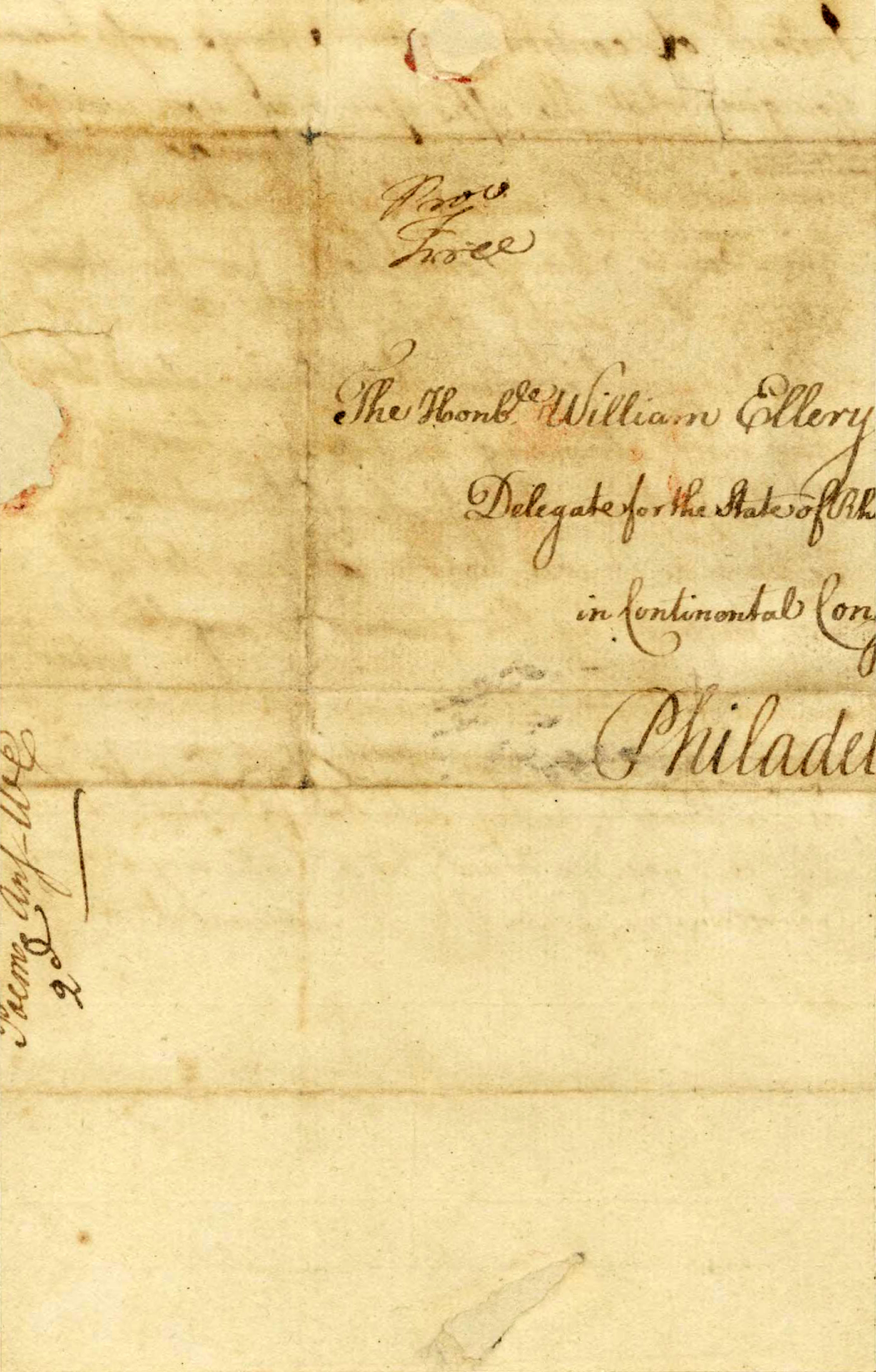
George Wythe and William Ellery, Poems on Witty Subjects in Congress, American Revolutionary War Manuscripts Collection, Boston Public Library, MS.Ch.E.8.31-33.[1]
Contents
- 1 Manuscript text, November-December 1776
- 1.1 "A Member of the Antinovanglian Faction to W. E.," by George Wythe (VA)
- 1.2 "A Novanglican to G.W.," by William Ellery (RI)
- 1.3 "Instead of Controlling Our Mary's Cross Humor," by William Ellery
- 1.4 "For Farms in Utopia, the Moon, or Some Fairyland," by George Wythe
- 1.5 With One Epigram, Though Well Hit Off" by George Wythe
- 1.6 "Unless You Will Take One Line for Your Ten," by William Ellery
- 1.7 "You've Not Only Quitted Your Arrear," by George Wythe
- 1.8 "The Gen'rous Idea Your Last Piece Expresses," by William Ellery
- 1.9 Copy of Ellery's epigram, in Wythe's hand
- 1.10 Martial, Epigram 12.47, in Wythe's hand
- 1.11 "Those with Whom the Powers of Government," by George Wythe
- 1.12 "A Commissioner, to the People of Philadelphia," by William Ellery
- 2 See also
- 3 References
- 4 External links
Manuscript text, November-December 1776
"A Member of the Antinovanglian Faction to W. E.," by George Wythe (VA)
|
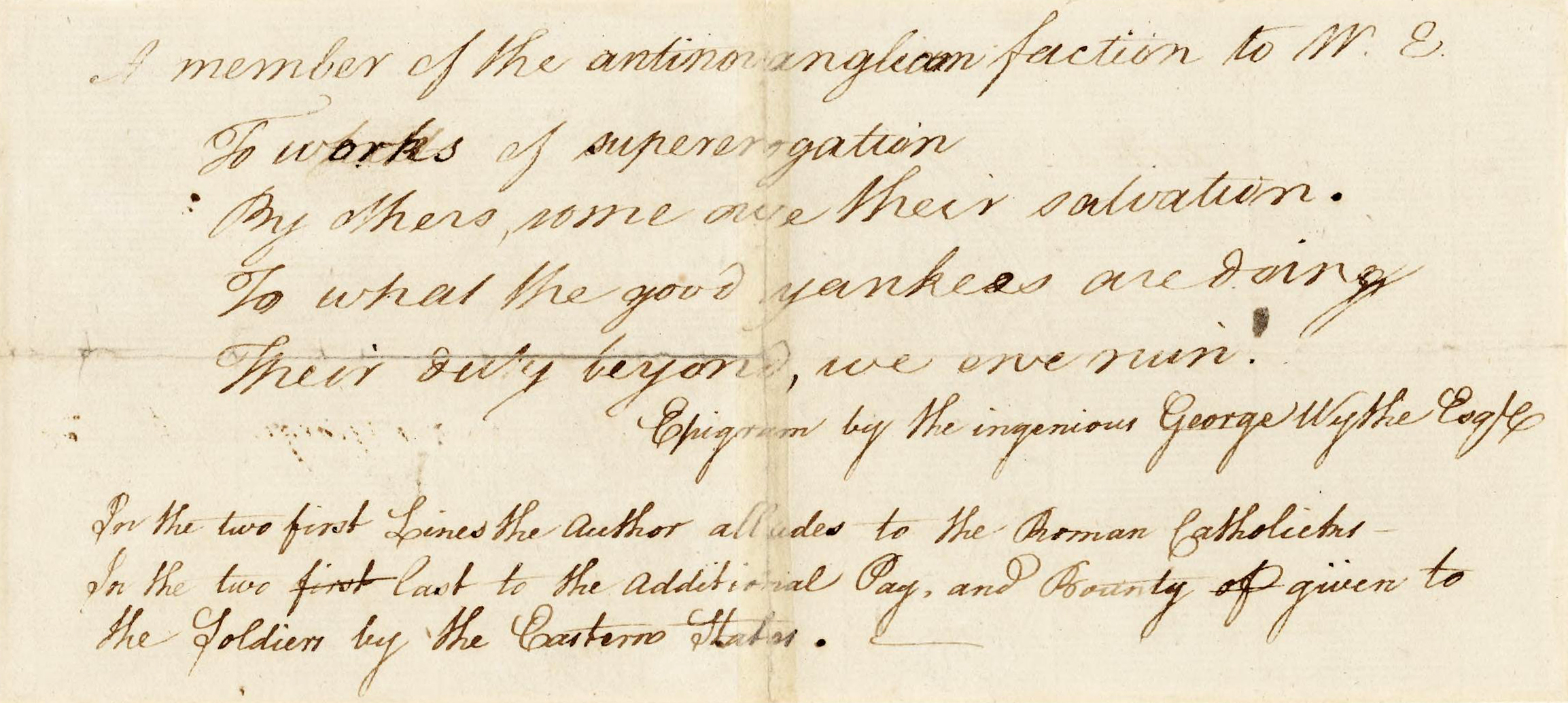 Manuscript endorsed on the reverse as "1st Poem", page seven of Poems on Witty Subjects in Congress, from the Boston Public Library's American Revolutionary War Manuscripts Collection. |
"A Novanglican to G.W.," by William Ellery (RI)
|
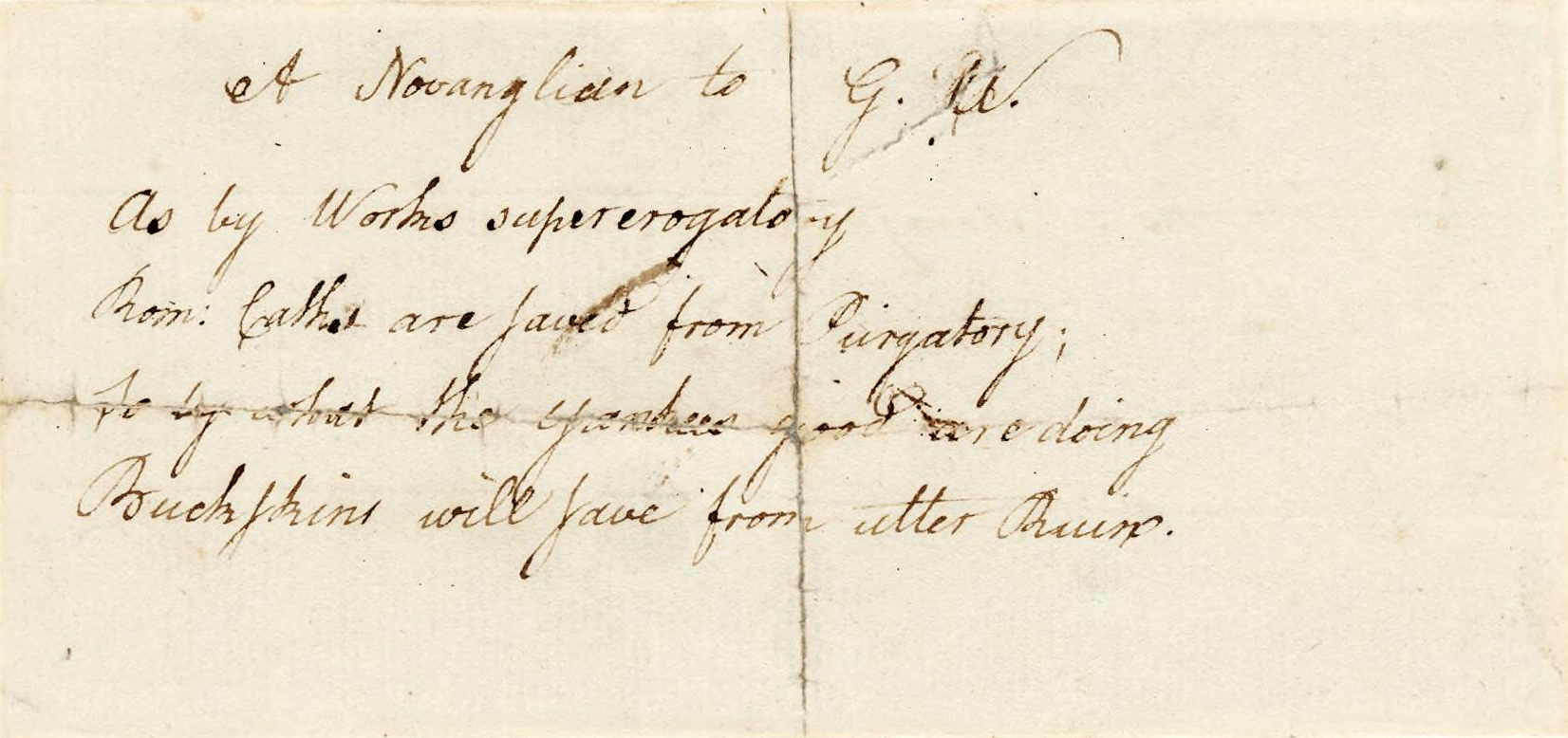 Endorsed on the reverse as "To G. Wythe / Answer to / 1.st Poem", page three of Poems on Witty Subjects in Congress, from the Boston Public Library's American Revolutionary War Manuscripts Collection. |
"Instead of Controlling Our Mary's Cross Humor," by William Ellery
|
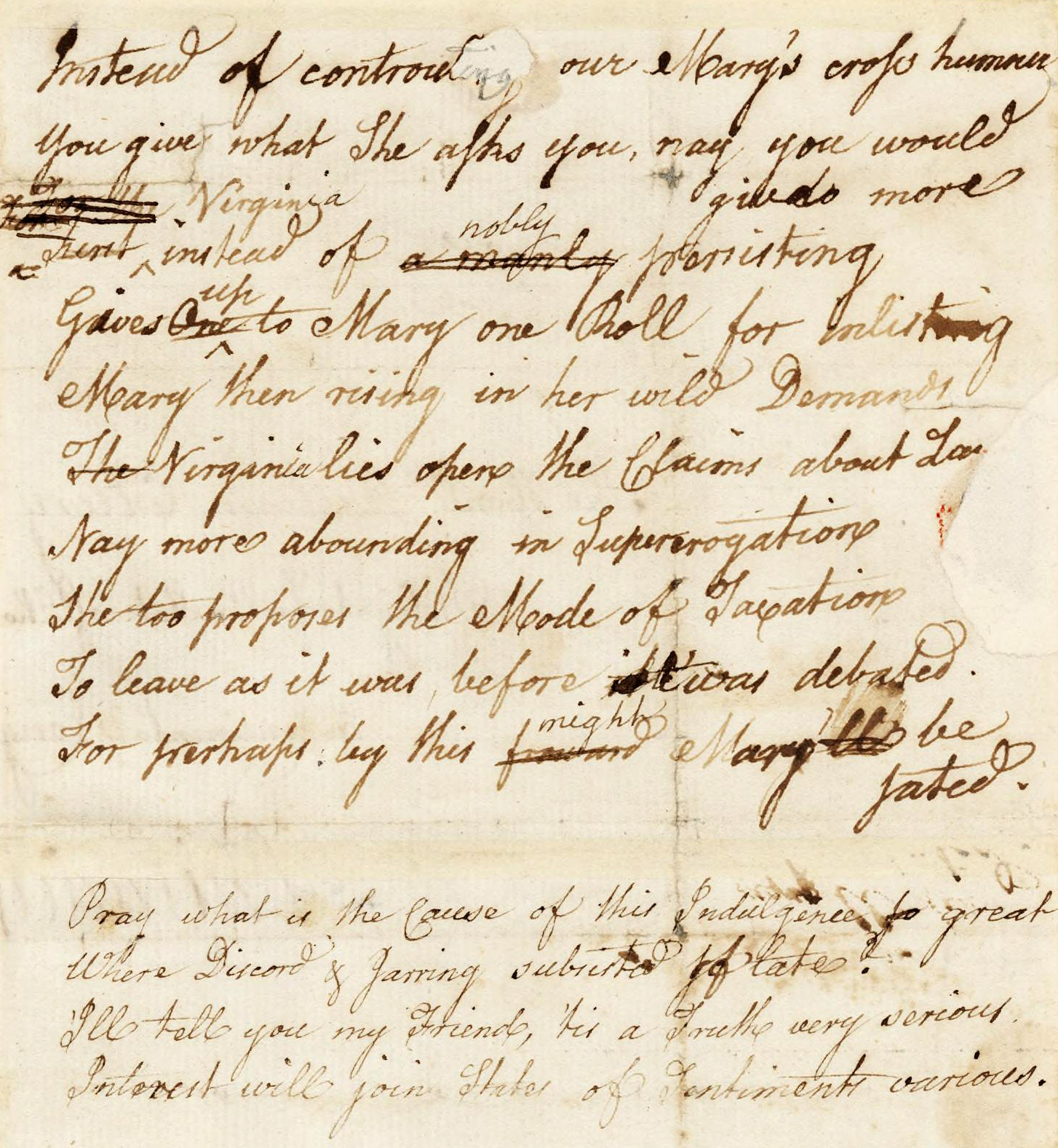 Manuscript endorses as "Poem Ans — WE / 2d", page five of Poems on Witty Subjects in Congress, from the Boston Public Library's American Revolutionary War Manuscripts Collection. |
"For Farms in Utopia, the Moon, or Some Fairyland," by George Wythe
|
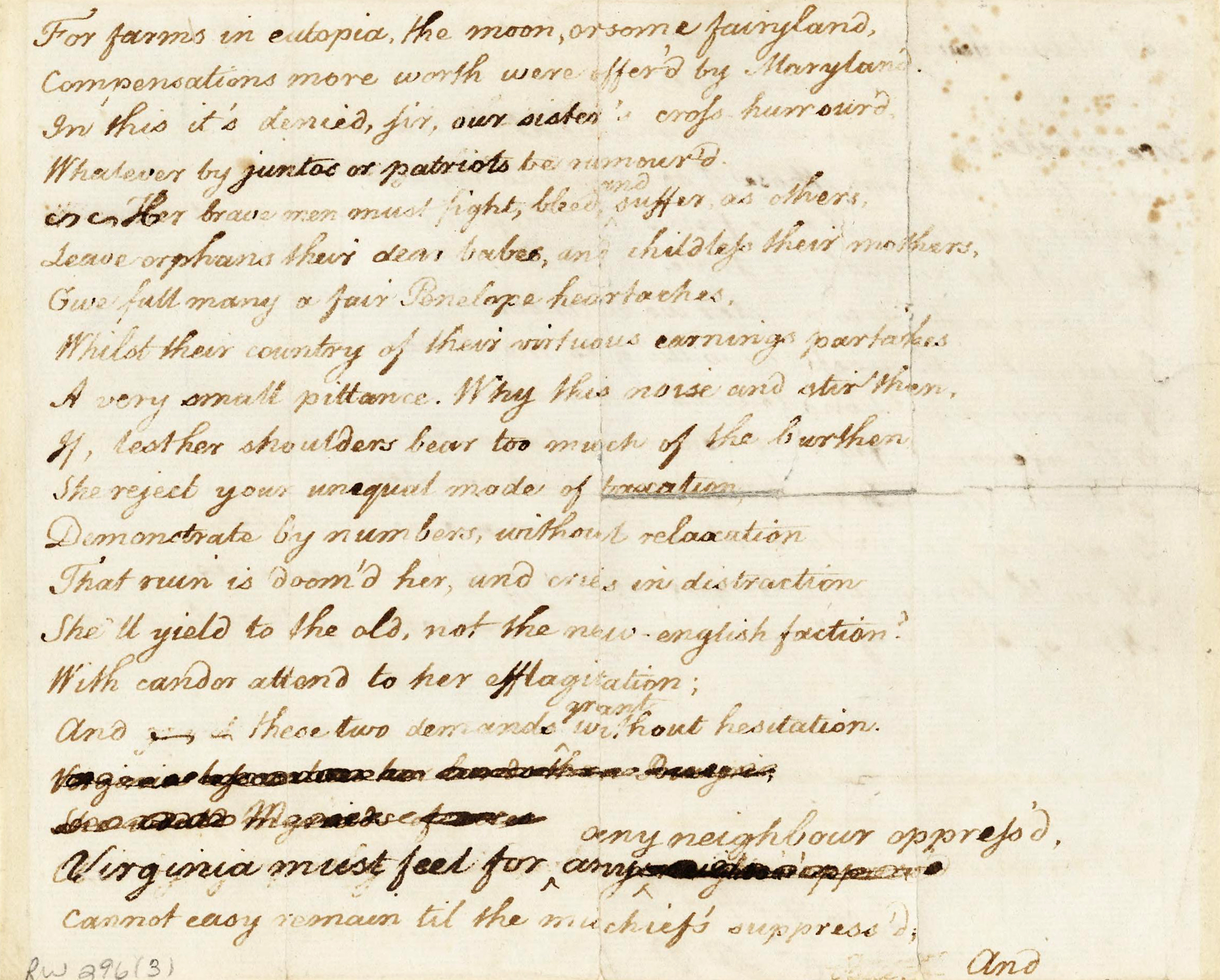 Page nine of Poems on Witty Subjects in Congress, from the Boston Public Library's American Revolutionary War Manuscripts Collection. | |
|
And if slaves you include in your capitation, |
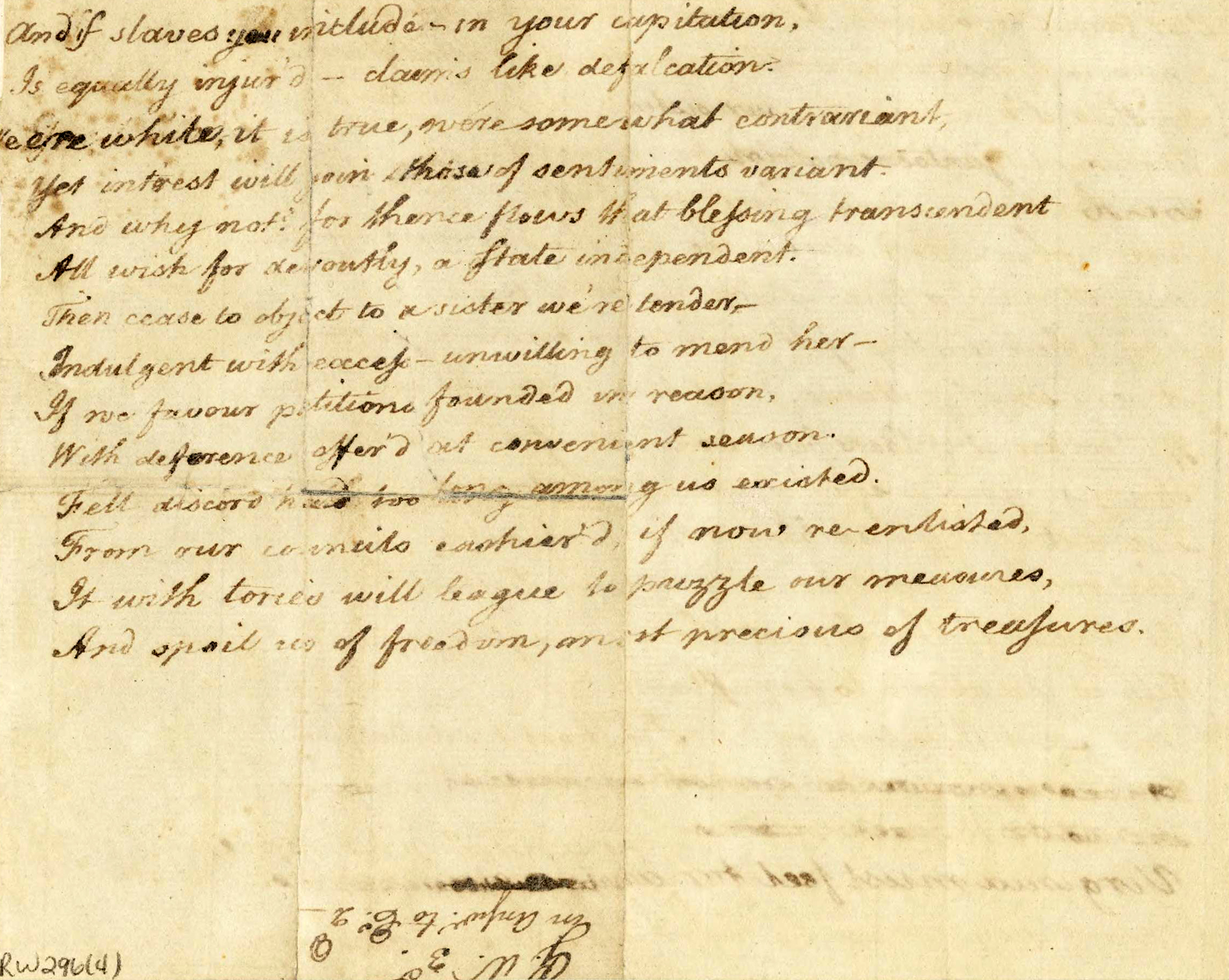 Manuscript endorsed as "G.W. 3d. / in Answr. to E.s 2d", page ten of Poems on Witty Subjects in Congress, from the Boston Public Library's American Revolutionary War Manuscripts Collection. |
With One Epigram, Though Well Hit Off" by George Wythe
|
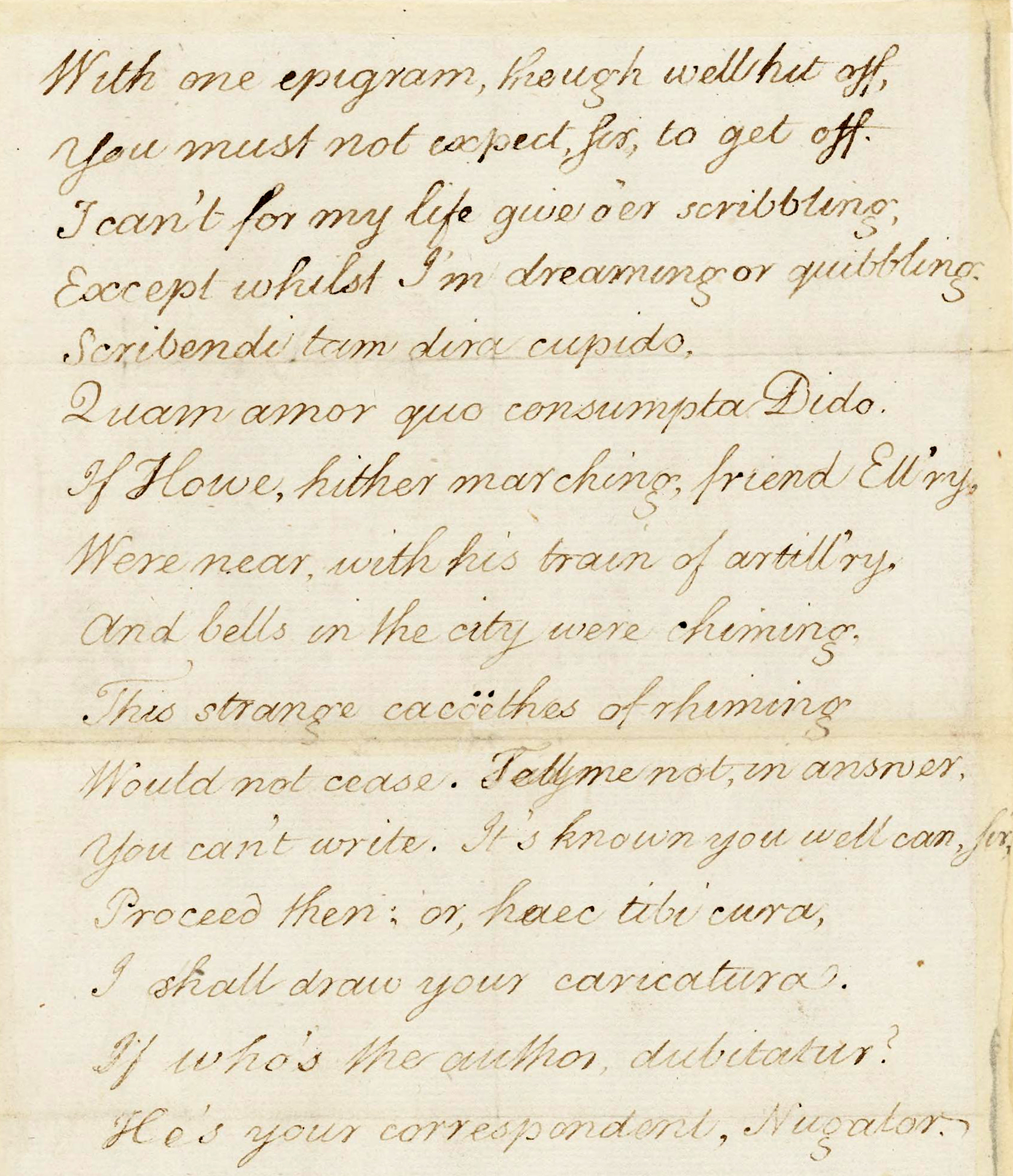 Manuscript endorsed |
"Unless You Will Take One Line for Your Ten," by William Ellery
|
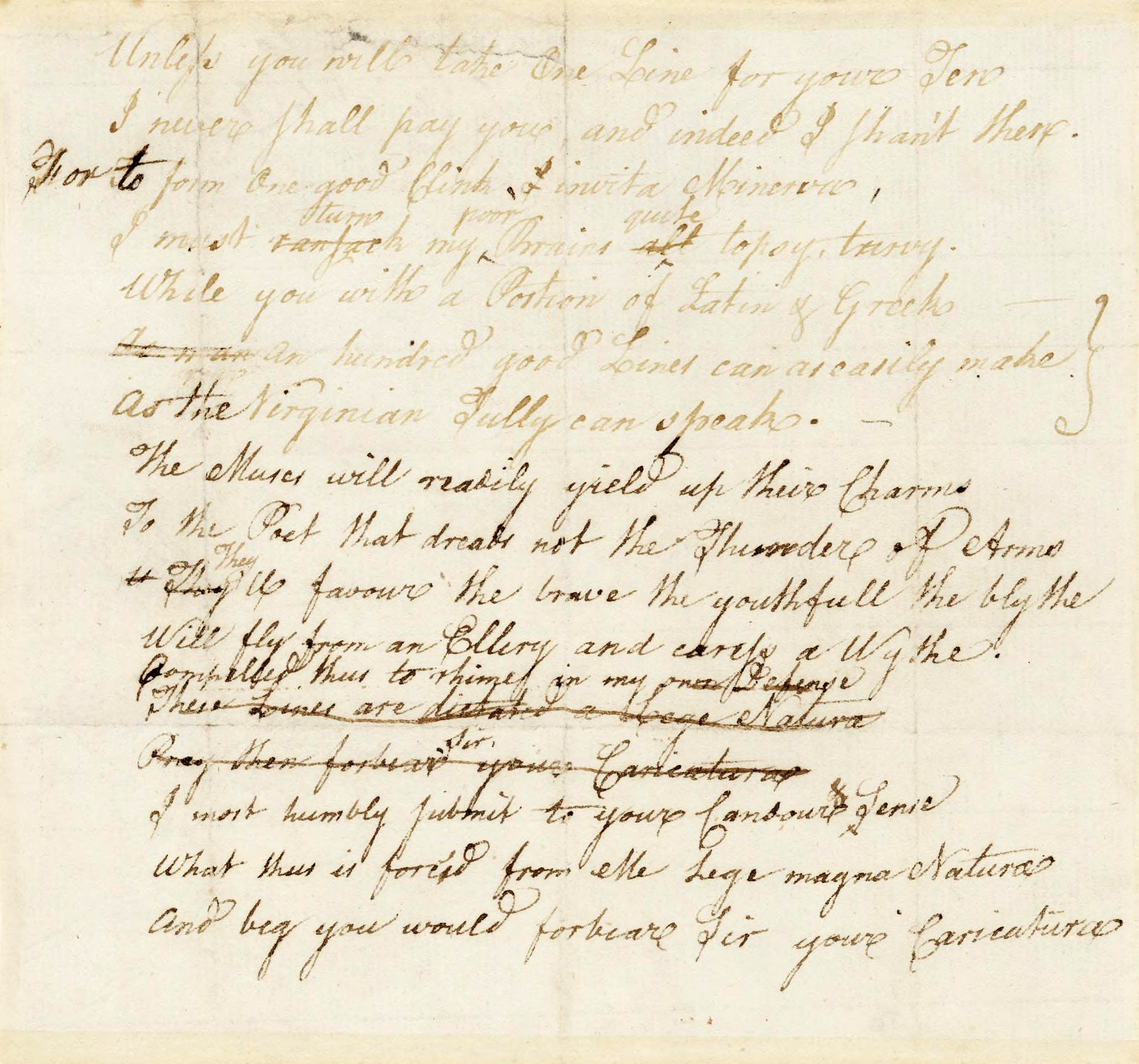 Manuscript endorsed "Answer E to / the Answr. to 4", page twenty-three of Poems on Witty Subjects in Congress, from the Boston Public Library's American Revolutionary War Manuscripts Collection. |
"You've Not Only Quitted Your Arrear," by George Wythe
|
|
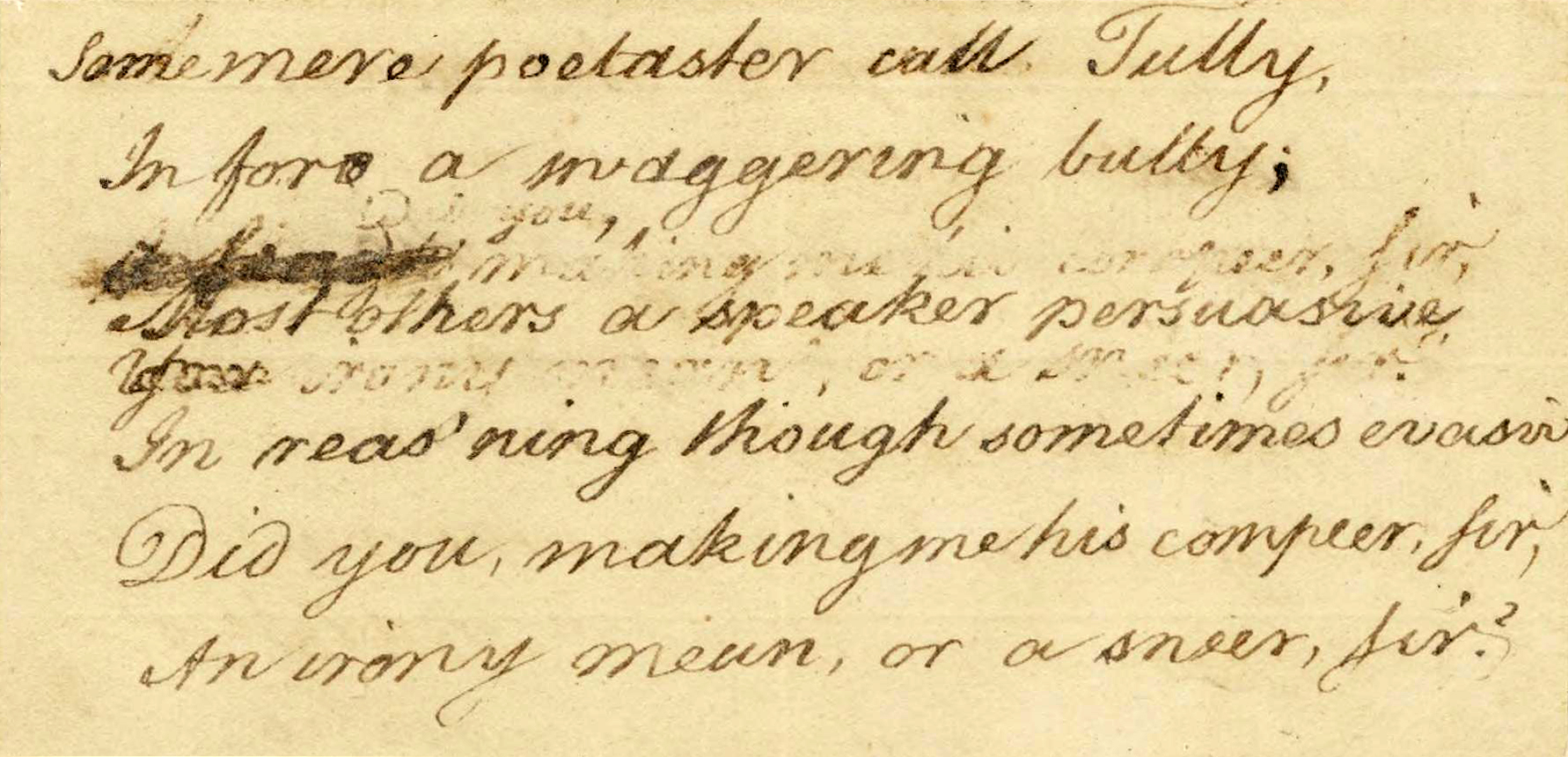 Manuscript endorsed "Poem W.5", page sixteen of Poems on Witty Subjects in Congress, from the Boston Public Library's American Revolutionary War Manuscripts Collection. |
"The Gen'rous Idea Your Last Piece Expresses," by William Ellery
|
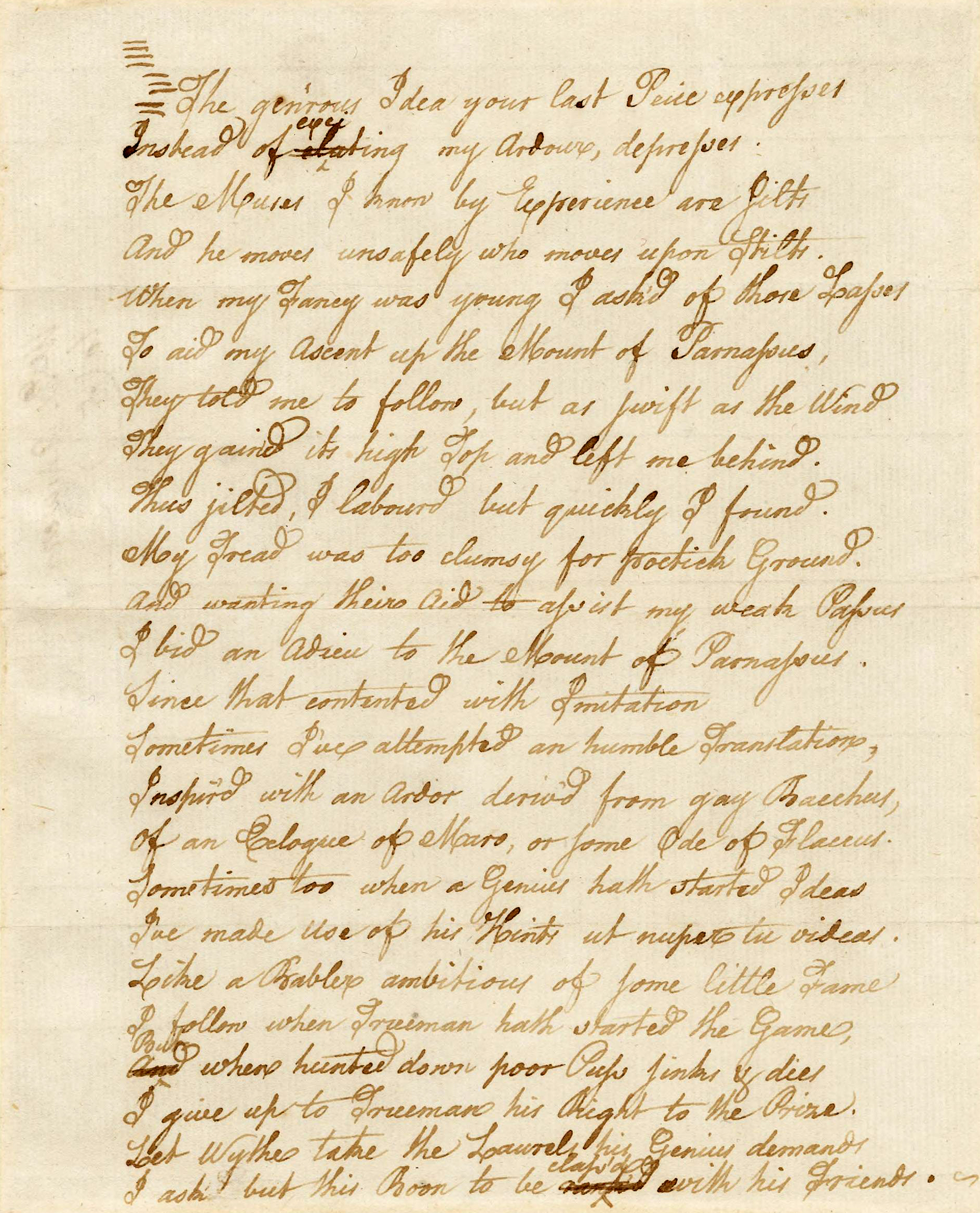 Manuscript endorsed "WE. Answer / to 5", page twenty-five of Poems on Witty Subjects in Congress, from the Boston Public Library's American Revolutionary War Manuscripts Collection. |
Copy of Ellery's epigram, in Wythe's hand
|
Martial, Epigram 12.47, in Wythe's hand
|
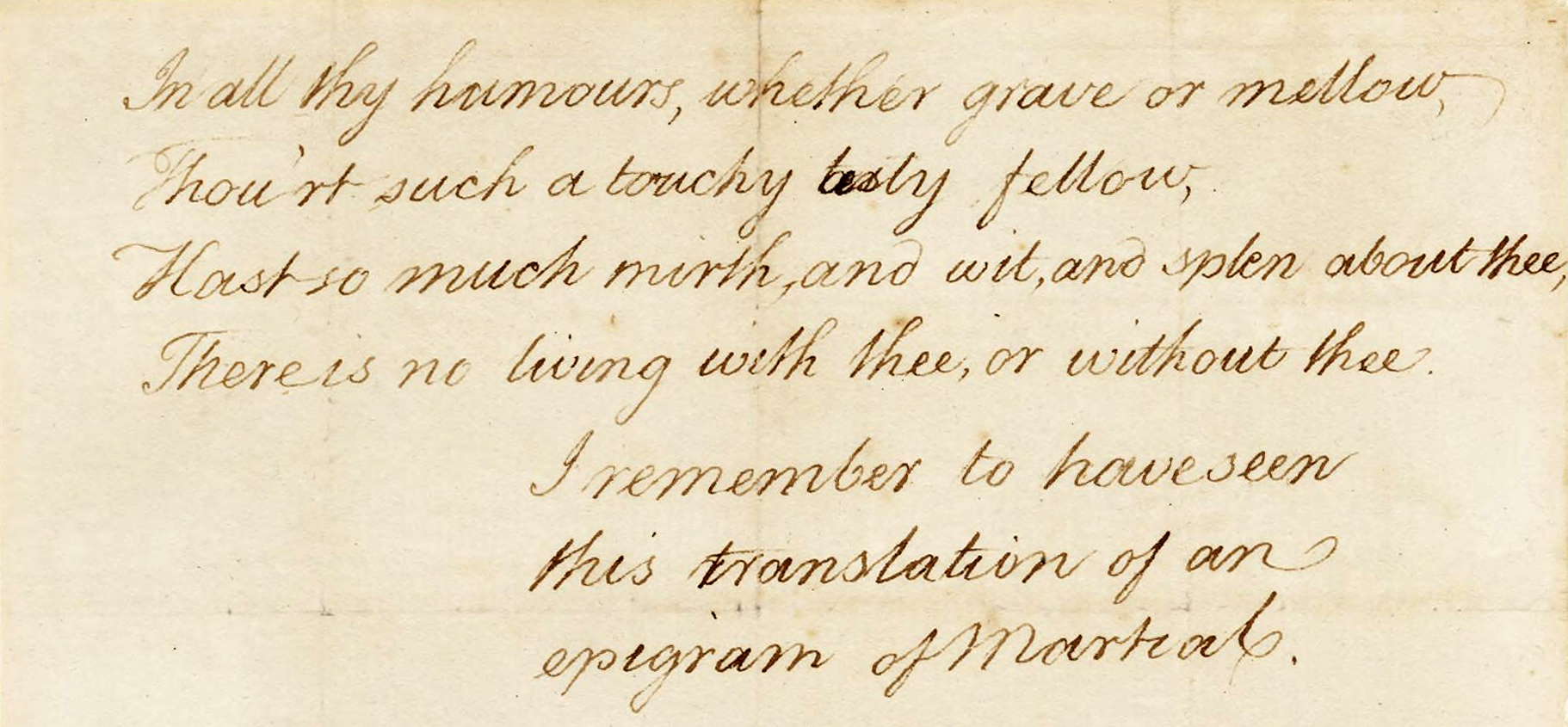 Page thirteen of Poems on Witty Subjects in Congress, from the Boston Public Library's American Revolutionary War Manuscripts Collection. |
"Those with Whom the Powers of Government," by George Wythe
In this mix prose and verse, Wythe seems to be trying to bring to light some complaint with Congress regarding a late ballot, which he entreats the "college of censors" to inquire upon, despite one of those involved being as respected as Nestor of Greek mythology (but false as Milton's Belial):
|
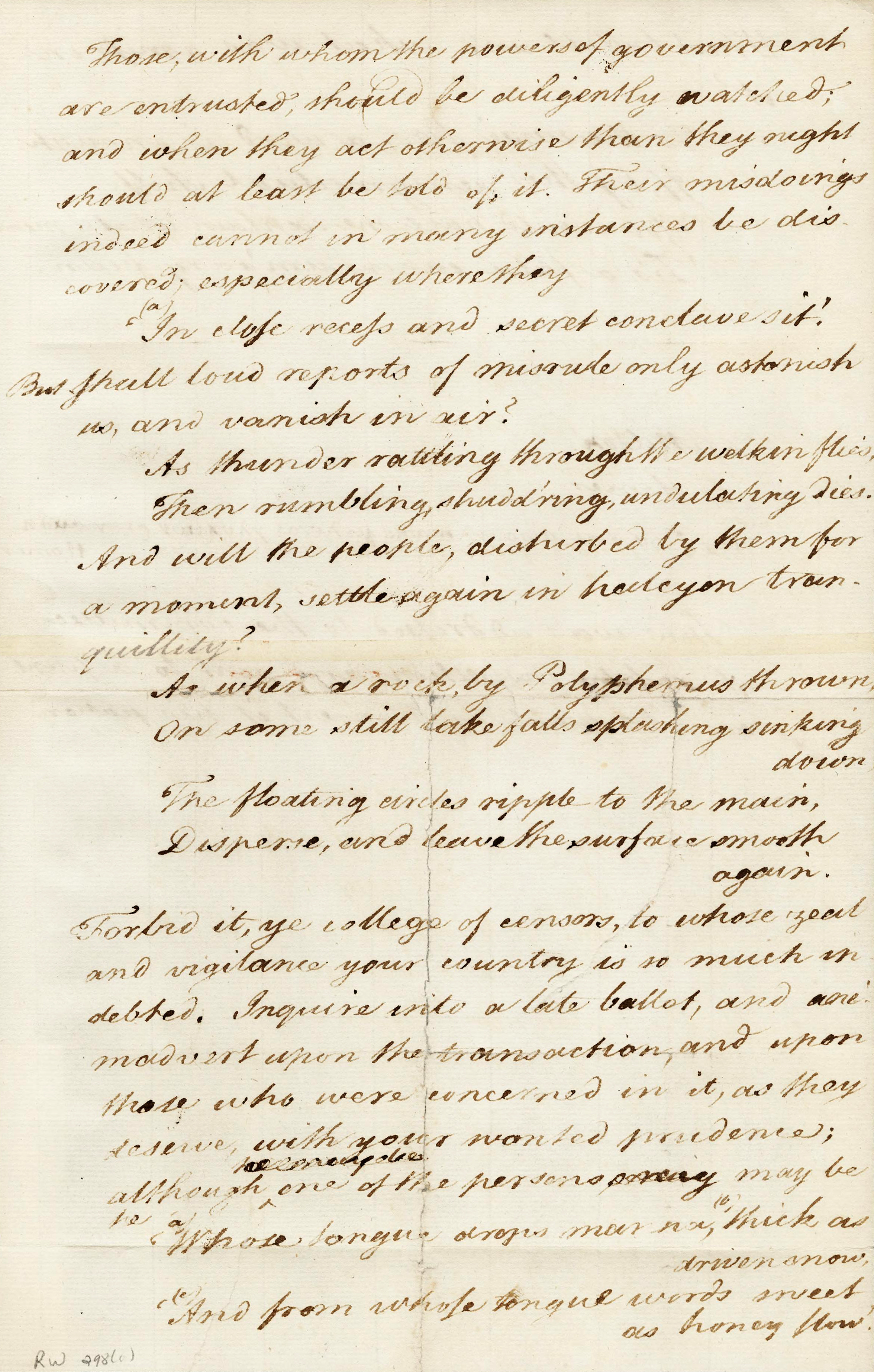 Page nineteen of Poems on Witty Subjects in Congress, from the Boston Public Library's American Revolutionary War Manuscripts Collection. | |
|
"A Commissioner, to the People of Philadelphia," by William Ellery
In this poem, Ellery chastises the conservative position of Andrew Allen, delegate from Pennsylvania, for his commonwealth's reluctance to support independence from Great Britain. The first letter of each line spells out "ANDREW ALLEN" (emphasized here). Ellery apparently attempted to get the poem published, as there is another draft with the lines transposed to avoid obvious "libellus famosos" (libel), and a dialogue with a reluctant printer:
|
|
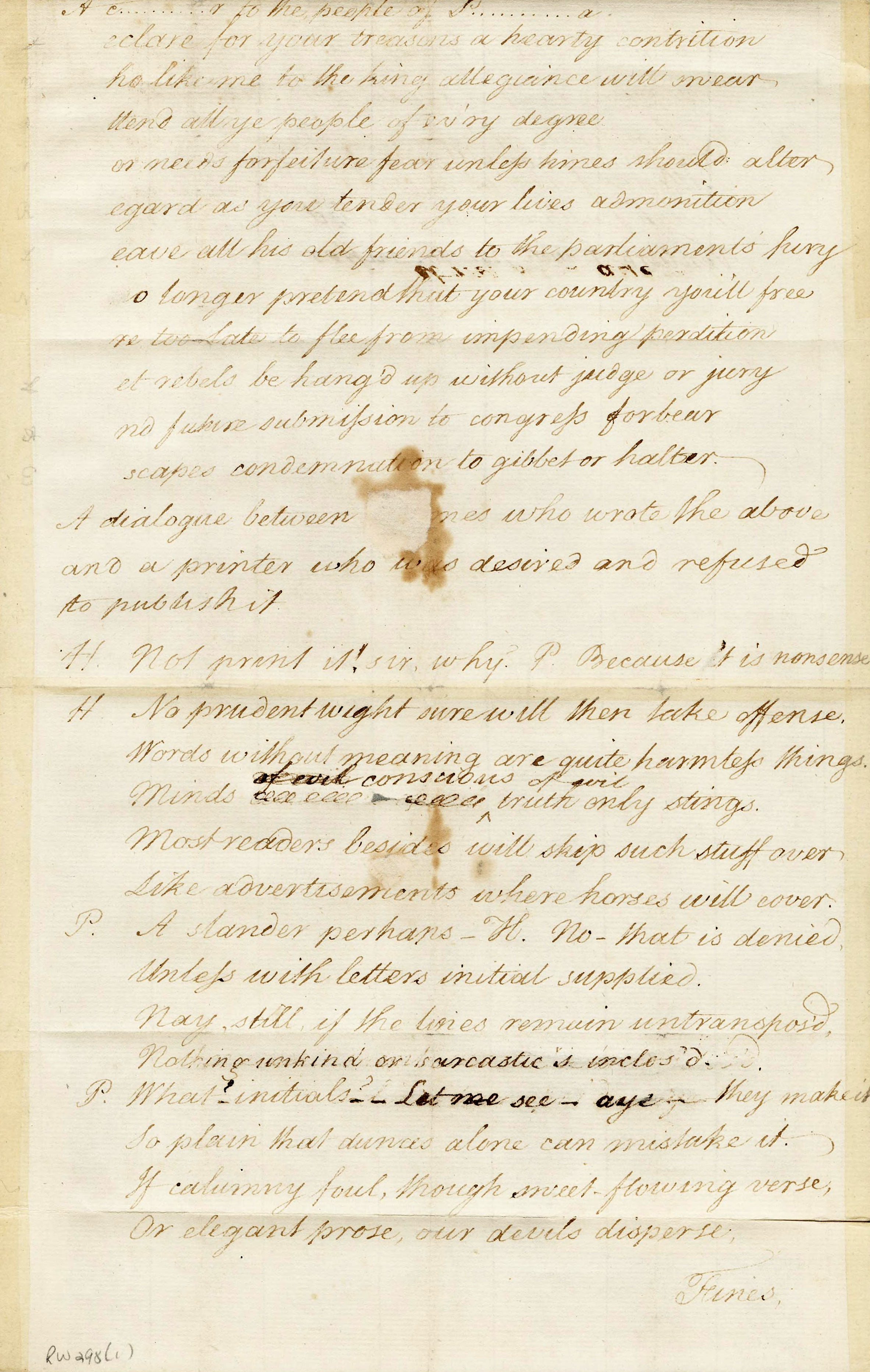 Page nineteen of Poems on Witty Subjects in Congress, from the Boston Public Library's American Revolutionary War Manuscripts Collection. | |
|
See also
References
- ↑ See W. Edwin Hemphill, "George Wythe Courts the Muses," William and Mary Quarterly 3rd ser., 9, no. 3 (July 1952), 338-345.
- ↑ "Novanglian": New Englander.
- ↑ "Dire desire to write," paraphrase of Virgil, Aeneid, Book V, line 721.
- ↑ "The love which consumed Dido," Queen of Carthage.
- ↑ General William Howe, (1729 – 1814), Commander-in-Chief of British forces during the American Revolutionary War, captured Philadelphia in September, 1777.
- ↑ Ovid, Ex Ponto III, xxxvi.
- ↑ Dubitatur: "It is doubted."
- ↑ Jester, clown.
- ↑ Defy nature, literally "go against Minerva's will." Cicero, De Officiis, I, 31, 110.
- ↑ Wythe is a Virginian Cicero: Marcus Tullius Cicero.
- ↑ A great law of Nature.
- ↑ Classical Greek cry of exultation or triumph, traditionally addressed to Apollo the healer.
- ↑ Bawbee: a Scottish half-penny.
- ↑ "As of late, you see."
- ↑ Milton's demonic council in ''Paradise Lost,'' Book I, lines 792-797: "But far within,/And in their own dimensions, like themselves,/The great seraphic lords and cherubim/In close recess and secret conclave sat;/A thousand demigods on golden seats/Frequent and full."
- ↑ Milton, Paradise Lost, Book II, lines 112-113: "On the other side uprose/[[wikipedia:Belial|]], in act more graceful and humane./A fairer person lost not Heaven; he seemed no/For dignity composed, and high exploit,/But all was false and hollow, though his tongue/Dropped manna, and could make the worse appear/The better reason, to perplex and dash/Maturest counsels...."
- ↑ Homer, Iliad, Book XII, line 278-279: Stones are volleyed by the Trojans and Achaeans "as flakes of snow fall thick on a winter's day."
- ↑ Homer's admiration of Nestor, in the Iliad, Book I, line 249: "But Atreides/raged still on the other side, and between them Nestor/the fair-spoken rose up, the lucid speaker of Pylos,/from whose lips the streams of words ran sweeter than honey."
- ↑ Wythe translates this line of Homer as "And from whose tongue words sweet as honey flow."
- ↑ Libellus famosos: libel.
- ↑ A reference to the colonial punishment of cutting off ears?
- ↑ Edmund Curll (c. 1675 – 1747), whose name was synonymous with "unscrupulous publication and publicity."
External links
- Read these poems in the Internet Archive.
- Boston Public Library, Special Collections.
- American Revolutionary War Manuscripts at the Boston Public Library, Internet Archive.
